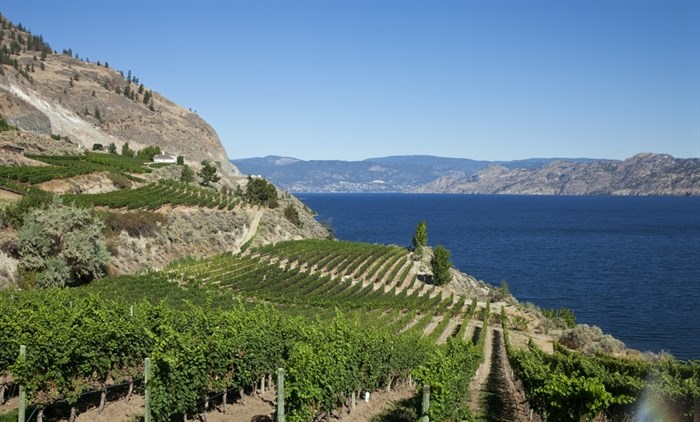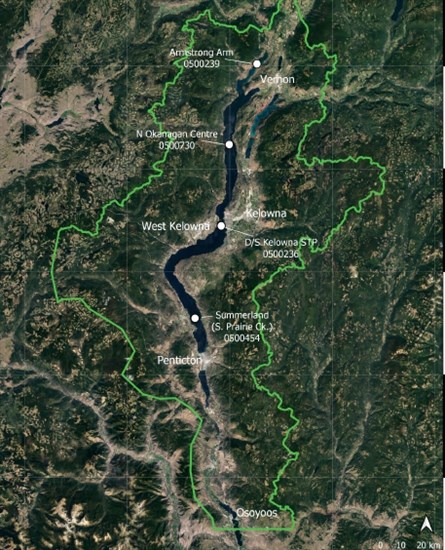
Image Credit: Shutterstock
May 13, 2021 - 6:00 AM
Okanagan Lake, particularly in its shallower north end, continues to be impacted by the increasing human activity near its shores.
Data collected from four locations: Summerland, Kelowna, Okanagan Centre and Armstrong Arm (north end of the lake) on Okanagan Lake from 2011-2020, shows tests from the Armstrong Arm failed to meet secchi depth objectives every year. The tests use a device to measure water clarity in the lake.
Human activities including agriculture, cattle range, logging and septic systems close to the shoreline are having an impact on the lake, according to a report prepared by Larrett Aquatic Consulting for the Ministry of Environment and Climate Change Strategy.
There was also a drop in water clarity in the northern section when comparing data dating back to 1973, according to the report.
READ MORE: Despite above average snowpack, risk of flooding in Okanagan Lake still low
“The current lower water clarity likely relates to the cumulative effects of increased population and human activities within the Okanagan watershed over the past 30 years,” according to the report.

A map showing where water samples were collected from Okanagan Lake.
Image Credit: Okanagan Lake Collaborative Monitoring Agreement
The north end of the lake, which is shallower than other sections, is currently “most at risk for water quality degradation including harmful algae blooms, poor drinking water quality, anoxic conditions, and further eutrophication.”
High densities of potentially toxic cyanobacteria in the lake’s north end were also reported between 2018-2020.
Nitrate levels have been increasing since the 1970s, which suggests a connection to human activities, according to the report. Phosphorus in Okanagan Lake saw a decreasing trend from 1973 to 2005, but began to increase from 2005 onwards with the exception of samples taken in Summerland, according to the report.
Nitrogen and phosphorus are the most important nutrients in most aquatic environments. Algae production is limited by the availability of nutrients. In the Okanagan, phosphorus is the main limiting nutrient and its concentration is directly linked to the amount of algae that the lake produces, according to the report.
Phosphorus concentrations were highest in the north end of the lake where they exceeded 2020 objectives.
“There were increasing trends in phosphorus levels from 2011-2020 at Okanagan Centre, Kelowna, and particularly in the Armstrong Arm where the increase was greatest. The Armstrong Arm is more heavily impacted by human activities and has numerous phosphorus sources. The rise in phosphorus levels at Okanagan Centre and Kelowna likely speak to the impact of the 2017-2018 freshets on Okanagan Lake,” according to the report.
READ MORE: Invasive shrimp in Okanagan Lake still an issue after 50 years
The report recommends the ministry complete another summary report at the end of the next three-year cycle, continue to analyze taxonomy samples in Okanagan Centre and Armstrong Arm and consider working with the City of Vernon and District of Lake Country for inclusion in this program given their current and future plans for treated effluent disposal.
The Ministry of Environment in partnership with the City of Kelowna, the Regional District of Central Okanagan, and the District of Summerland began a seasonal sampling program on Okanagan Lake in 2011 to increase the temporal resolution of water quality data being gathered at the four areas in the lake.
To contact a reporter for this story, email Carli Berry or call 250-864-7494 or email the editor. You can also submit photos, videos or news tips to the newsroom and be entered to win a monthly prize draw.
We welcome your comments and opinions on our stories but play nice. We won't censor or delete comments unless they contain off-topic statements or links, unnecessary vulgarity, false facts, spam or obviously fake profiles. If you have any concerns about what you see in comments, email the editor in the link above.
News from © iNFOnews, 2021